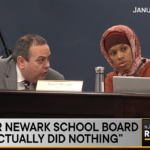
All New Jersey Voters Should Care About Newark School Board Elections
April 12, 2024
JAMES: Education Department Responds to No-Bid Contract Concerns in Newark
April 15, 2024Ed Law Center: This Private School Voucher Bill Is Extremely Dangerous
The Education Law Center argues, “Make No Mistake – A Tax Credit Voucher is a Voucher” as part of a campaign “to ensure that public funds are used to support and strengthen public schools.”
School vouchers divert public funds to pay for private education expenses. The current version of A4144/S3035 proposes a well-known type of voucher program called a “tax credit” voucher. Here’s how it works:
Individuals and corporations give money to “student support organizations” that hand out vouchers for private school tuition. They get back most of the funds they “donated” in the form of a credit against their tax liability—money that would have gone into the state treasury to support public schools and other public goods. So, instead of funding the constitutionally mandated public education system that serves the vast majority of students, those tax dollars are diverted to private schools serving a small number of children without meaningful quality or accountability standards.
Funding a voucher program through a tax credit instead of a direct appropriation does not make it any less a voucher. When the State provides a tax credit for funds sent to a third-party, voucher-granting organization, it is simply laundering funds that should have gone into the state treasury. Courts, scholars, and the public have already identified this ruse. Professor Kevin Welner of the University of Colorado-Boulder explained over a decade ago that these tax credit “neovouchers” are simply “kissing cousins of conventional vouchers”:
With conventional vouchers, the state effectively bundles tax revenue and distributes it as vouchers. With neovouchers . . . the taxpayer and the nonprofits play that role, while the state backfills the funding, reimbursing the taxpayer. Yet after all these machinations, the end result is almost unchanged. The state’s final budget still reflects the loss of tax revenue, and the voucher remains in place.1
Further proof these programs are vouchers is how vigorously school privatizers promote them. The voucher advocacy group EdChoice tracks various “types of private school choice” programs on its website, with “tax credit scholarships” listed right alongside conventional “school vouchers” and “education savings accounts.”2 Pro-voucher groups tweak the terminology and details of voucher programs to try to evade legal, political and community objections, but these are all just different names for the same thing.
A4144/S3035 Has Changed but it’s Still Hugely Problematic
1) The amended version of the NJ voucher bill now on the Legislature’s website drops the amount of voucher money available from $250 million to $37.5 million annually. This and other changes to the bill are no doubt results of the April 2 letter to the Governor and Legislative Leadership signed by 40 NJ organizations and a dozen national organizations.3
But even if the new bill decreased the amount of voucher money to $1, that would be too much. Starting with a small voucher program is just another sleight of hand—once vouchers get a foot in the door, program size and cost will almost inevitably increase.4 Arizona and Florida are just two of many stark examples where pro-voucher groups convinced lawmakers to begin with modest programs that now cost each state a billion dollars (or more!) per year.5 Look at our neighbor, Pennsylvania: its original tax credit voucher program was funded at $20 million dollars. As of last year, the state was diverting over $400 million to tax credit vouchers annually.6 This is the crucial moment to protect the state from eventual runaway expenses because a door opened to vouchers is almost impossible to close.
2) Unlike the earlier version of the bill, the new version has an anti-discrimination provision. However, all that provision says is that an eligible private school must “compl[y] with all federal and State anti-discrimination statutes.” It is not clear which statutes this covers (for example, does it include special education laws?), and the language covers only
private schools, not the voucher-granting organization. Furthermore, this provision does not require private schools to follow the same anti-discrimination requirements as public schools; it simply requires them to comply with existing anti-discrimination laws. Such laws contain broad exceptions for private and religious schools. Thus, this anti discrimination provision is arguably meaningless!
3) The tax credit voucher in the new version is for 75 cents on the dollar instead of a one-for-one credit. Big deal! It still means that three-quarters of what is meant to go to the state treasury to fund programs that NJ residents support and rely on goes to private, not public, uses. 4) Another hastily added provision inserts a public school grant program into the voucher bill. The amount provided would be trivial in the context of chronic underfunding of the public school funding formula over decades. Moreover, the services that would be funded by these grants, such as mental health programs, are essential educational resources. In fact, the bill admits they are “needed support” for students in low-income districts. It is shameful to hold these constitutionally required public school services hostage to the passage of a voucher program.
Voucher Programs are Unpopular and Unconstitutional
New Jersey already spends tens of millions of public dollars each year on transportation, textbooks, nurses, security, and technology for private school students.7 The Legislature must focus on continuing to meet its constitutional obligations to public schools, not sending additional dollars to private schools.
Polls have repeatedly shown that a majority of voters across the political spectrum don’t want private school vouchers and do want public funds to be spent on public schools.8In fact, every time voters have had the opportunity to weigh in at the ballot box, they have rejected voucher programs.9
Voucher programs have repeatedly been struck down by the courts for violating state constitutions (examples: Nevada, Louisiana, Kentucky). In 2022, the Kentucky Supreme Court evaluated a tax credit voucher program— the same type of voucher being proposed in New Jersey—and unanimously declared it unconstitutional. NJ’s constitutional protections for public education, and the state court decisions enforcing them, are robust. Enacting a voucher law would invite litigation to vindicate the rights of NJ students.
1 Kevin Welner, The Neovoucher: A Kissing Cousin in Disguise, School Administrator 66(6) (June 2009).
2 EdChoice, Types of School Choice, https://www.edchoice.org/school-choice/types-of-school-choice/.
3Insider NJ, The following is an open letter to Governor Phil Murphy, Senate President Nick Scutari, Assembly Speaker Craig Coughlin and the entire state Legislature (Apr. 2, 2024).
4 Samuel E. Abrams & Steven J. Koutsavlis, The Fiscal Consequences of Private School Vouchers, Public Funds Public Schools (2023). 5 Shar Porier, ESA Vouchers Have Cost Arizona Taxpayers Nearly $1 Billion, Herald Review (Jan. 31, 2024); Leslie Postal, Florida’s Voucher Plan Could Cost Public Schools Nearly $4 Billion, Report Says, Orlando Sentinel (Jan. 24, 2023).
6 Education Voters of Pennsylvania, Pennsylvania Voucher Schools Use Tax Dollars to Advance Discrimination (2023).
7 N.J.A.C. § 6A:27-2.2 (transportation); N.J.S.A. 18A:58-37.1 to 58-37.14 (textbooks); N.J.S.A. 18A:40-23 to 40-31 and N.J.A.C. 6A:16-2.5 (nurses); N.J.S.A. 18A: 41-7 (security); N.J. Dep’t of Educ., Nonpublic School Services, https://www.nj.gov/education/nonpublic/state/tech/index.shtml (technology—authorized by annual Appropriations Act).
8 Anna Saavedra, et al., Searching for Common Ground: Widespread Support for Public Schools but Substantial Partisan Divides About Teaching Potentially Contested Topics, University of Southern California (Feb. 2024). 9 Rob Boston, The People Have Spoken: Private School Vouchers Have a Long Track Record of Failure at the Ballot Box, Church and State Magazine (Jan. 2019).





1 Comment
The money should follow the child. Most people in my circle are in favor of vouchers. If for no other reason, then that the public schools have to become more competitive, wooing private school families back. Free market education. There is a reason so many have left the public school system following Covid and not returned. maybe if the schools were accountable, they would be forced to listen to the concerns of the community instead of ‘the will of parents be damned, and we’ll take those tax dollars anyway’. If so very many parents are seeking school alternatives from the public school system that it is fiscally crushing the public school system, then perhaps the schools should look within as to why.